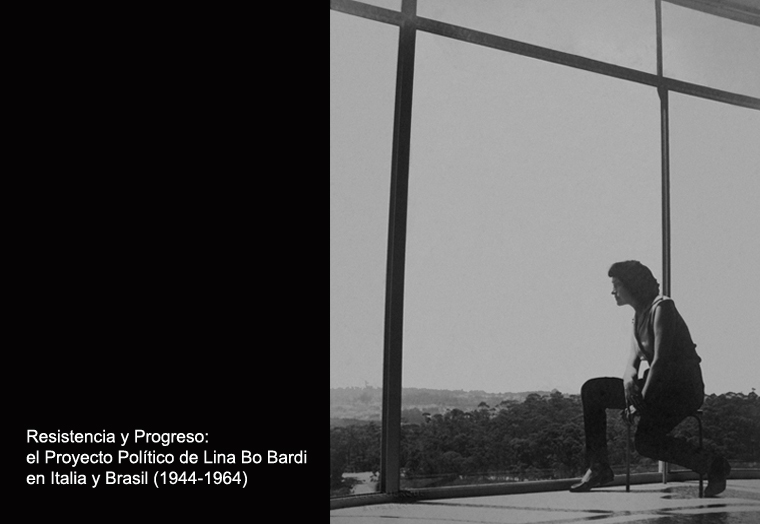La presente investigación parte de la constatación de que los estudios realizados hasta la fecha sobre la obra de la arquitecto Lina Bo Bardi no contemplan una faceta fundamental de la misma: su naturaleza política.
Nacida en Italia, en 1914, emigrada a Brasil, en 1946, la arquitecto sufrió el hostigamiento de dos dictaduras: la fascista (1922-1943), en su patria natal; la militar (1964-ca.1980), en la que elegiría para residir. Al igual que las medidas represivas de tales gobiernos, la Segunda Guerra Mundial marcaría su persona profundamente, infundiéndole una visión política del mundo. Inspirada en la ideología comunista, y los principios humanistas que intelectuales de izquierda difundieran en Italia durante la Guerra, dicha visión impregnaría su legado de tal manera que ambos pueden entenderse como una única cosa. Esta posibilidad sugiere el arranque de la presente disertación.
Motiva también el emprendimiento de la misma la relativa parcialidad con que los estudios aludidos refieren, en sus desarrollos, el contexto social, político y cultural en que Lina vivió y trabajó. La llamada al contexto en tales revisiones apenas se pone en relación con el perfil ideológico y la actividad profesional de Bo Bardi. Ello explica por qué existe un buen número de monografías sobre las diferentes facetas de la carrera de la arquitecto y casi ninguna revisión crítica global de su legado.
Por otro lado, los estudios citados tienden a subestimar la influencia, sobre el pensamiento y labor de Lina, de Pietro María Bardi, el periodista y marchante de arte con quien se casaría. Aunque se ha apuntado en alguna ocasión, tal influencia no se ha desglosado en las razones que fundamentan el objetivo político de las iniciativas que, bien conjunta o separadamente, promoverían a partir de su encuentro.
Otro aspecto relevante al respecto ha sido la falta de consideración, por parte de los estudios mencionados, de la continuidad entre el enfoque con que Lina trabajó primero en Italia y, posteriormente, en Brasil. Por lo general, las revisiones de su obra se han concentrado en una de las dos áreas geográficas, desestimando el valor que el temprano posicionamiento ideológico de Bo Bardi, en el país mediterráneo, tendría para las responsabilidades que asumiría en el atlántico.
Las lagunas enunciadas invitan a examinar la actividad de Lina desde un punto de vista inédito: el de su entendimiento de la arquitectura como una función política mediante la que transformar el mundo. Motivado por la voluntad de disipar tales lagunas, el análisis del universo creativo de Bo Bardi a través de las lentes de su entorno, antes que de las suyas propias, contribuye, en la disertación, a ubicar su obra en el curso de la historia, asunto aún pendiente en su bibliografía.
La investigación que ha precedido la redacción de esta tesis permite anticipar que la obra de Lina Bo Bardi estuvo motivada por fines políticos, en especial, entre 1944, cuando se unió a la Resistencia Italiana como miembro del grupo de arquitectos modernos Movimento di Studi per L´ Architettura; y 1964, cuando el golpe de estado que la cúpula militar de Brasil dio en el país frenó su actividad profesional, obligando a la arquitecto a permanecer ‘en silencio’ por más de 15 años. La misma investigación posibilita adelantar que la polifacética carrera que Lina desarrolló en el periodo mencionado aspiró a cursar la disolución de las discrepancias económicas que polarizaban entonces las sociedades italiana y brasileña mediante la promoción de la cultura. No en vano, Bo Bardi creía que la popularización de la alta cultura, en aquellos días pasto de la clase aventajada en los dos países, aseguraría a ambos un destino más democrático. La consecución de una Nación como Estado, frente al modelo de Estado como Nación que prevalecía en un país y otro, se convertiría, así, en el fin último de su trabajo.
Aparte, el estudio muestra que, particularmente en Brasil, la arquitecto dirigió su labor a suscitar la emergencia de una cultura genuina, libre de influencias extranjeras y capaz de representar los valores del país con dignidad. Los dos objetivos enunciados —la popularización de la cultura y el combate al imperialismo cultural—, inspirarían a Bo Bardi el concepto de ‘Nuevo Humanismo’, una posición desde la que impulsar el progreso autónomo de un país en el mundo. En la medida en que, en el periodo cubierto por el estudio, la obra de Lina reflejaría su responsabilidad al respecto, la misma puede verse como un ‘proyecto’ político. Éste constituye el enunciado de la tesis central en el presente estudio.





